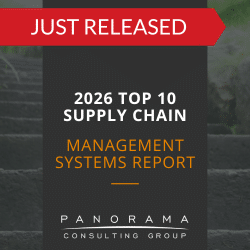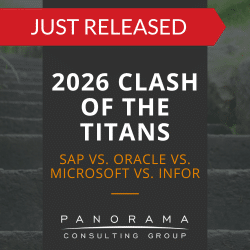- Implementing a finance ERP system requires assessing business needs, setting clear goals, and choosing a solution that aligns with long-term objectives.
- Strong project management and cross-functional collaboration are essential to navigating ERP implementations, particularly in data migration.
- Rigorous system testing before go-live is key to optimizing financial operations and minimizing disruptions.
- Post-implementation support and continuous change management help organizations adapt and maximize the long-term value of their finance ERP systems.
Implementing a finance-specific ERP system can streamline core financial processes, improve compliance, and provide real-time data for better decision-making. However, achieving these benefits requires a strategic approach—aligning the system with organizational goals and managing the process carefully from start to finish.
Today, we’re sharing seven tips for a successful finance ERP implementation, from assessing business needs and selecting the right solution to testing and training. By following these best practices, organizations can optimize financial operations and drive growth.
Expert Tips for Implementing a Finance ERP System
1. Assess Business Needs and Set Clear Goals
Before implementing a finance ERP system, it’s essential to thoroughly assess your current financial processes and identify pain points. This assessment allows you to prioritize key features and identify business goals, such as automating manual processes or improving reporting accuracy.
Other examples include:
- Improving compliance
- Reducing time spent on monthly closes
- Providing better financial visibility
- Improving multi-currency reporting
Defining these objectives upfront ensures the system delivers value and serves as a benchmark for evaluating success.
2026 Clash of the Titans
SAP, Oracle, Microsoft, and Infor each have a variety of systems that can support data-driven decision-making. We surveyed customers of these four vendors to find out what their selection and implementation process was like.
2. Select the Right Finance ERP System
Choosing the right ERP system is critical. The selected system must cover core financial functions, such as general ledger, accounts payable, and accounts receivable, while offering advanced capabilities like budgeting, forecasting, and analytics. You should also consider scalability, flexibility, and the ability to integrate with existing systems.
Additionally, it’s important to involve key stakeholders—including finance and IT teams—in the decision-making process. This includes requirements gathering, attending vendor demos, and more.
For example, Panorama’s ERP consultants often conduct gap analyses and needs assessments to help clients evaluate systems based on their specific financial and strategic needs.
3. Prepare Employees for the New Software
Organizational change management comprises a set of tools and methodologies for mitigating resistance and ensuring full adoption of the system’s capabilities.
This means outlining how the ERP implementation will impact various teams and what changes employees can expect. It also means securing leadership support to reinforce the importance of the new system.
Additionally, you should include user training in your change management plan. Users must understand system navigation, process execution, and problem-solving to ensure smooth adoption and use.
For example, an organization might conduct role-based workshops focusing on key finance processes, like automated invoice processing, real-time budget tracking, and generating multi-dimensional financial reports.
4. Build a Strong Implementation Team
Successful ERP implementation requires robust project management. This begins with building an effective team, typically comprising of a project manager and internal finance and IT teams. Each team member plays a role in ensuring the system aligns with financial needs and is implemented on time and on budget.
Clear communication and timeline management are crucial for staying on track. Milestone tracking and issue resolution should be central to the project plan to avoid delays and maintain focus. This level of vigilance may require project oversight from an independent ERP consultant.
(Learn about ERP project oversight.)
5. Ensuring Data Accuracy and Integrity
Data migration is one of the most complex aspects of a finance ERP implementation. It involves moving existing financial data from legacy systems into the new ERP system, while ensuring accuracy and consistency.
More specifically, the data migration process involves cleansing outdated or duplicate data, mapping legacy data to the new system’s structure, and testing the migration to ensure that all records remain intact.
Throughout this process, system integration is an important consideration. You must consider how the ERP system will connect with existing enterprise systems, such as HR, CRM, and supply chain management systems. Ensuring that the finance ERP system integrates seamlessly with these platforms is critical for maintaining end-to-end process efficiency and avoiding data silos.
6. System Testing and Ongoing Training
Before going live, rigorous system testing is crucial to confirm that all financial functions perform as expected. Testing should cover financial reporting, process automation, and any customized features.
Equally important is ongoing user training. Finance teams and other stakeholders must continue to practice role-specific scenarios, such as closing the books, handling complex transactions, and generating compliance reports.
7. Go-Live and Post-Implementation Support
The go-live phase marks the official transition to the new ERP system. Monitoring system performance and offering ongoing technical support are essential steps for minimizing disruptions to financial operations.
Ongoing change management is also vital. This ensures that employees continue to build confidence in using the system for more complex tasks and decision-making.
The Value of Expert Guidance in ERP Implementation
Implementing a finance ERP system is a complex yet transformative process that, when done right, optimizes financial operations and supports strategic growth.
Given the complexity and scope of ERP implementations, partnering with an experienced ERP consulting firm can make a significant difference in success. Panorama Consulting provides vendor-neutral expertise to guide organizations through every phase of implementation—from assessing business needs to managing post-implementation support—ensuring that your ERP system delivers lasting value.
Contact us below to learn more.













